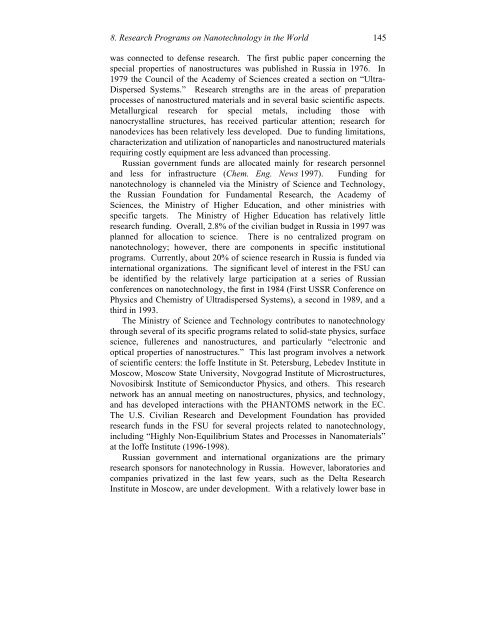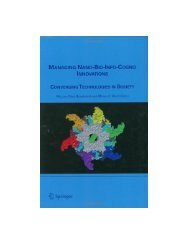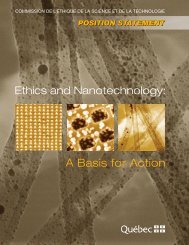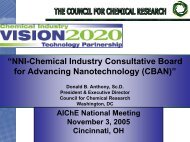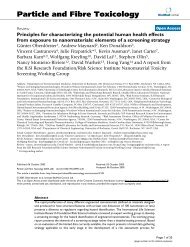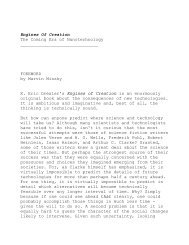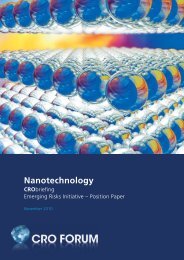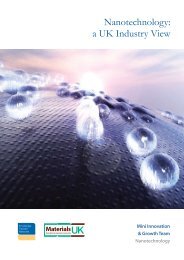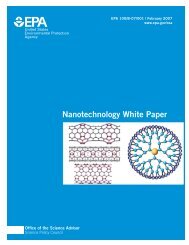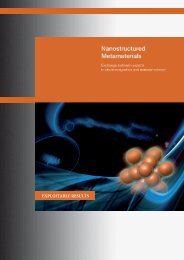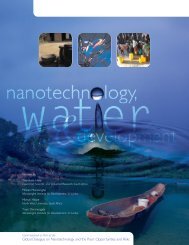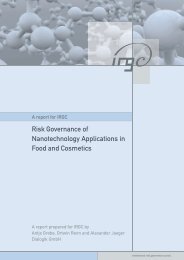Nanostructure Science and Technology - World Technology ...
Nanostructure Science and Technology - World Technology ...
Nanostructure Science and Technology - World Technology ...
You also want an ePaper? Increase the reach of your titles
YUMPU automatically turns print PDFs into web optimized ePapers that Google loves.
8. Research Programs on Nanotechnology in the <strong>World</strong> 145<br />
was connected to defense research. The first public paper concerning the<br />
special properties of nanostructures was published in Russia in 1976. In<br />
1979 the Council of the Academy of <strong>Science</strong>s created a section on “Ultra-<br />
Dispersed Systems.” Research strengths are in the areas of preparation<br />
processes of nanostructured materials <strong>and</strong> in several basic scientific aspects.<br />
Metallurgical research for special metals, including those with<br />
nanocrystalline structures, has received particular attention; research for<br />
nanodevices has been relatively less developed. Due to funding limitations,<br />
characterization <strong>and</strong> utilization of nanoparticles <strong>and</strong> nanostructured materials<br />
requiring costly equipment are less advanced than processing.<br />
Russian government funds are allocated mainly for research personnel<br />
<strong>and</strong> less for infrastructure (Chem. Eng. News 1997). Funding for<br />
nanotechnology is channeled via the Ministry of <strong>Science</strong> <strong>and</strong> <strong>Technology</strong>,<br />
the Russian Foundation for Fundamental Research, the Academy of<br />
<strong>Science</strong>s, the Ministry of Higher Education, <strong>and</strong> other ministries with<br />
specific targets. The Ministry of Higher Education has relatively little<br />
research funding. Overall, 2.8% of the civilian budget in Russia in 1997 was<br />
planned for allocation to science. There is no centralized program on<br />
nanotechnology; however, there are components in specific institutional<br />
programs. Currently, about 20% of science research in Russia is funded via<br />
international organizations. The significant level of interest in the FSU can<br />
be identified by the relatively large participation at a series of Russian<br />
conferences on nanotechnology, the first in 1984 (First USSR Conference on<br />
Physics <strong>and</strong> Chemistry of Ultradispersed Systems), a second in 1989, <strong>and</strong> a<br />
third in 1993.<br />
The Ministry of <strong>Science</strong> <strong>and</strong> <strong>Technology</strong> contributes to nanotechnology<br />
through several of its specific programs related to solid-state physics, surface<br />
science, fullerenes <strong>and</strong> nanostructures, <strong>and</strong> particularly “electronic <strong>and</strong><br />
optical properties of nanostructures.” This last program involves a network<br />
of scientific centers: the Ioffe Institute in St. Petersburg, Lebedev Institute in<br />
Moscow, Moscow State University, Novgograd Institute of Microstructures,<br />
Novosibirsk Institute of Semiconductor Physics, <strong>and</strong> others. This research<br />
network has an annual meeting on nanostructures, physics, <strong>and</strong> technology,<br />
<strong>and</strong> has developed interactions with the PHANTOMS network in the EC.<br />
The U.S. Civilian Research <strong>and</strong> Development Foundation has provided<br />
research funds in the FSU for several projects related to nanotechnology,<br />
including “Highly Non-Equilibrium States <strong>and</strong> Processes in Nanomaterials”<br />
at the Ioffe Institute (1996-1998).<br />
Russian government <strong>and</strong> international organizations are the primary<br />
research sponsors for nanotechnology in Russia. However, laboratories <strong>and</strong><br />
companies privatized in the last few years, such as the Delta Research<br />
Institute in Moscow, are under development. With a relatively lower base in


